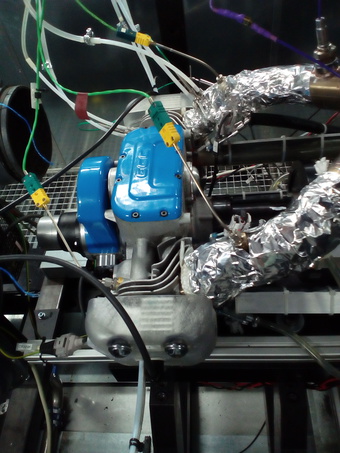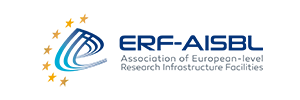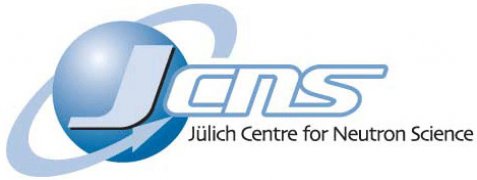Jülich Centre for Neutron Science (JCNS)
Social Media
The Jülich Centre for Neutron Science - JCNS (www.fz-juelich.de) is an institute within the Forschungszentrum Jülich GmbH. JCNS uses neutrons as microscopic probe to conduct research on condensed matter and life science systems. For this purpose, JCNS develops and builds neutron scattering instruments at leading national and international sources (at present: FRM II / MLZ, HFR / ILL and SNS / ORNL).
It operates these instruments for its own research and offers them in the form of a user facility to a broad national and international user community. In-house research of JCNS focuses on correlated electron systems and nanomagnetism as well as soft matter and biophysics. Within these areas of expertise, expert support is offered and ancillary laboratory access for external users from science and industry.
Instruments

Engine of the range extender at the test facilities of ESS Automotive. © Copyright: JCNS
The Jülich Centre for Neutron Science (JCNS) operates instruments at leading national and international sources: at the FRM II research reactor in Garching, Germany, at the high-flux reactor at the Institut Laue-Langevin (ILL) in Grenoble, France, and at the first megawatt-class (MW) spallation source, SNS, in Oak Ridge, Tennessee, USA. These instruments are made available for external users to conduct experiments by means of a procedure whereby proposals are reviewed by an independent group of experts. Thus, JCNS offers its users access to state-of-the-art neutron instruments under consistent experimental conditions at the neutron source, providing an optimal environment for each individual experiment undertaken. JCNS provides 17 specialized neutron spectrometers at the world's top neutron sources, thus providing its users with outstanding quality. In addition, JCNS serves as the organizational framework for Forschungszentrum Jülich's globally-recognized development programme for methods and instruments, as well as for its own research programmes in the field of Matter and Key Technologies.
The special role of JCNS in neutron research in Germany is based on its own consistent research programme, which relies on neutron-scattering methods in the areas of soft condensed and biological matter, as well as on nanomagnetism and highly correlated electron systems. In both areas, JCNS pursues (i) neutron instrumentation at the cutting edge of science and technology, based on a rigorous method development programme; (ii) the operation and development of specialized, and, in some cases, unique sample environments; (iii) the development of appropriate data reduction and modelling programmes; (iv) a clear scientific profile of those in charge of its instruments; (v) the provision of complementary techniques and supplementary laboratory facilities for preparing and characterizing samples. Finally, within Germany, JCNS leads the way in exploiting new opportunities for research with neutrons at the MW spallation sources.
"Breaking New Ground"
Video
What are neutrons, how are they produced and why are they indispensable for research? How does society benefit from neutron research and what are Forschungszentrum Jülich's contributions? These are just some of the issues regarding the key technology of neutron scattering explored in the ten-minute video on the Jülich Centre for Neutron Science (JCNS).
The video entitled "Breaking New Ground. The Jülich Centre for Neutron Research - JCNS" gives information on the work of the scientists at JCNS in a vivid and easy-to-understand manner. Animations illustrate how experiments with neutrons work; young researchers explain how the elementary particles give them unique insights into materials, which allows them to study new concepts for data storage or provide them with a deeper understanding of biological processes.
The video presents the mission of JCNS and the activities of its users as well as the institute's branch offices in Garching near Munich, in Grenoble (France) and in Oak Ridge (USA). The video closes with an outlook on Jülich's involvement in the world's most powerful neutron source, which is currently being built in Lund in Sweden. JCNS has been pooling Jülich's expertise in neutron research since 2006 and was given the status of an institute in January 2011.


